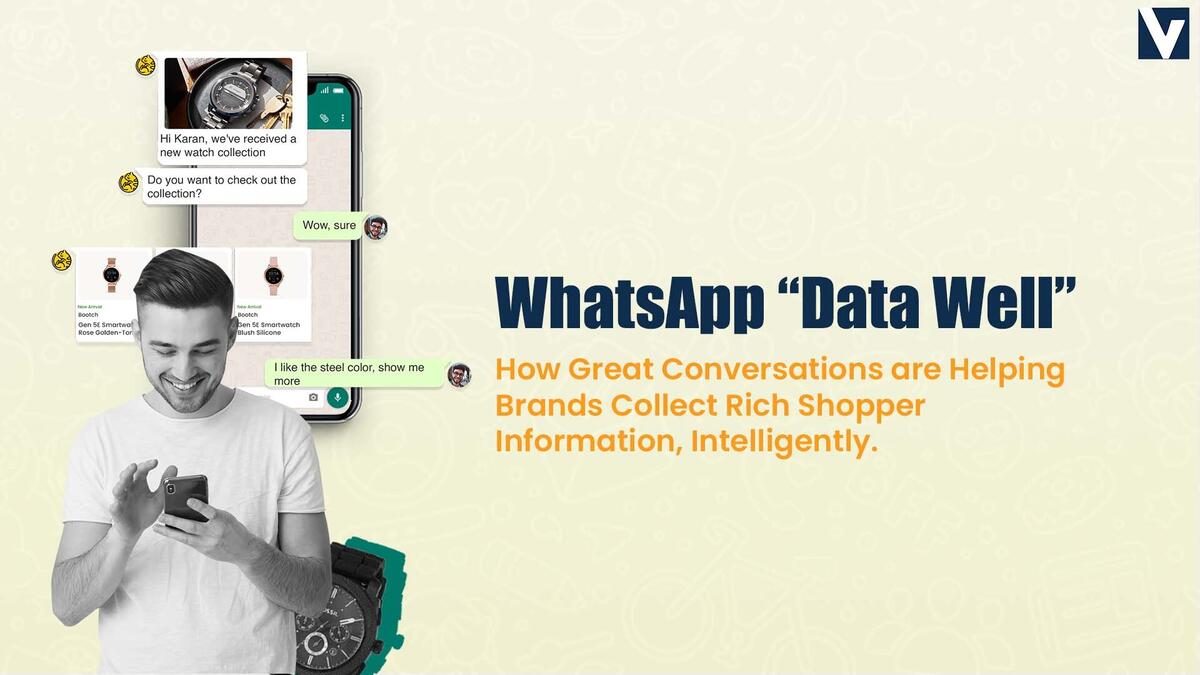November 12, 2021
Submitted by Sujoy Golan, Chief of Marketing & Omnichannel Platforms, Affle

“Hi Ma’am, can I help you find anything?”
“Yes, I’m looking for some dresses”
“Formal?”
“No, party wear. Size medium”
“Ok, what’s the occasion?”
“It’s my birthday tomorrow”
“Oh, fantastic. We’ve just launched a new collection. Let me show you some options.”
Sounds familiar? It’s a standard conversation between any retail store employee and a shopper, Packed with information. And as they continue there would be even more data “unlocked” related to the shopper’s preferences. It is what the staff at every store has trained for - harnessing the power of a great conversation.
The problem is none of this gets recorded and hence used. And it’s even more challenging for digital shoppers: to get any information on people who’re browsing through your e-commerce website, you first need them to create an account with you or go on to complete the purchase.
What if one could meld the richness of one-to-one conversations in a retail setting, with the comfort of digital shopping?
WhatsApp is ushering in experiential shopping
Last year, Will Cathcart, the Head of WhatsApp announced that 100 billion messages are now sent on the app daily. WhatsApp now has more monthly active users than Facebook’s app. It is also one of the highest affinity channels marketers have ever come across - users check their WhatsApp notifications almost immediately and spend approximately 40-minutes on the app every day.
For many users, it’s not such a big leap from chatting with friends to chatting with brands, with almost 80% saying they were likely to engage with brands via messaging and almost half of Millennials reporting that they’ve already interacted with chatbots on a messaging app. According to the teams at WhatsApp, approximately 175 million people send messages to business accounts every day.
Whether they are seeking product information, gift advice, a shop location, flexible delivery, a dinner reservation, or making an impulse purchase, people are chatting with businesses for a wide range of reasons.
Consider the grocery retail giant, Carrefour Group which enables customers to input their zip code on WhatsApp and find their nearest store. Shoppers then receive a digital promotion catalog directly through WhatsApp specific to the location where they shop, tailored to weekly deals, seasonal promotions, and other offers that help them save money and plan their shopping.
Conversational data and its outcomes
With massive advances in natural language processing, chatbots of today can construct conversations that are more human-like compared to their predecessors from the early 2010s. Bots now can understand intent, make recommendations, resolve queries or just chat with far greater ease. Conversations with a powerful WhatsApp chatbot are intimate and can help collect rich data on the customer’s preferences - their location, age, style, monthly grocery list, important life events, and more.
All of this can be tied to individual shoppers based on their phone numbers. The data can be further enriched using a CDP that is connected to all your marketing channels and can create behavioral and psychographic profiles using powerful machine learning models. This is especially useful for companies opting for the direct-to-consumer model where owned customer data is critical for delivering memorable shopping experiences that differentiate their brands.
I believe that we’re still in the early versions of WhatsApp shopping. But brands are already using customer data favorably to develop increasingly sophisticated experiences that are driving higher conversion rates, average orders values, and customer loyalty.
For DTC brands, one-time shoppers make the majority of customers. Building customer loyalty involves more than delivering a stellar product and making a customer’s experience as smooth as possible. You also need to demonstrate to customers that their business is essential to you.
And here the data collected from customer conversations can be extremely useful in providing one-to-one shopping assistance at scale. Brands can build a sense of trust by using a messaging system to respond quickly to inquiries, notify when items are back in stock, share shipping updates, and check in to see how they’re enjoying their purchase.
Brands can extend the relationship beyond the initial transaction. Reach out with a product recommendation customers might like based on their history or let them know about a new line. Trigger a VIP promotion after they spend a certain amount or offer an enticement if they haven’t shopped for a while.
Building a conversational data hub
Like any mar-tech implementation, building a conversational data hub has to be a combined effort by the marketing, commerce, and IT teams. A conversational data hub needs to have a powerful AI chatbot, deep connection to the brand’s website, and inventory management systems to ensure that updated stock information is shared with shoppers irrespective of purchase on any channel. It must have the ability to accept orders and payments. And as discussed earlier it needs to be connected to the internal marketing systems and have a comprehensive analytics dashboard to help marketers know their shoppers and understand how they are interacting with this new channel.
Brands also need to resolve the build vs buy dilemma - do they want to buy just the WhatsApp business APIs, build their chatbots, analytics and integrations internally. Or do they wish to buy a plug-and-play package complete with conversation AI, CMS, order management system, and connectors with their other marketing systems?
In any case, we believe experimentation is the key here. Before investing heavily into the channel, brands must run small experiments to identify the shoppers that are most likely to buy on WhatsApp, the products that are most likely to sell, and also understand what a typical conversation looks like.
Embracing conversational commerce provides brands and retailers with an excellent way to innovate customer experiences and enhance sales across channels. However, not all formats are created equal. Therefore based on your customers’ preferences, and your product type, as a business you need to adapt your strategy and select mediums that are accurate to your target group.
